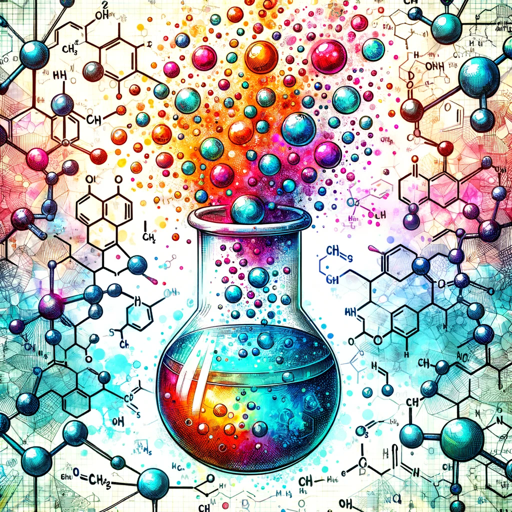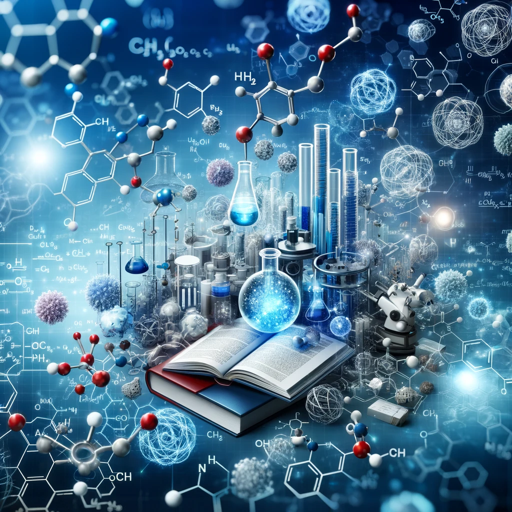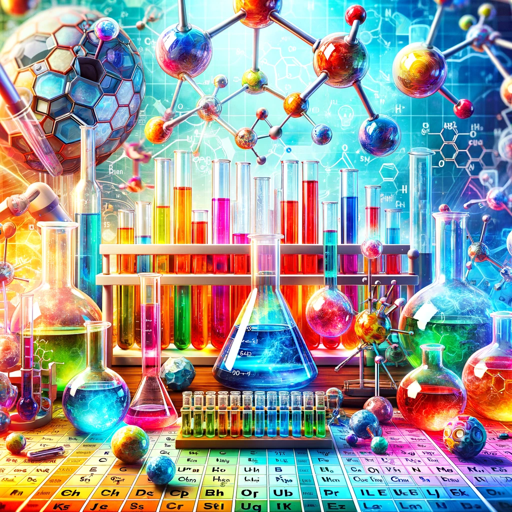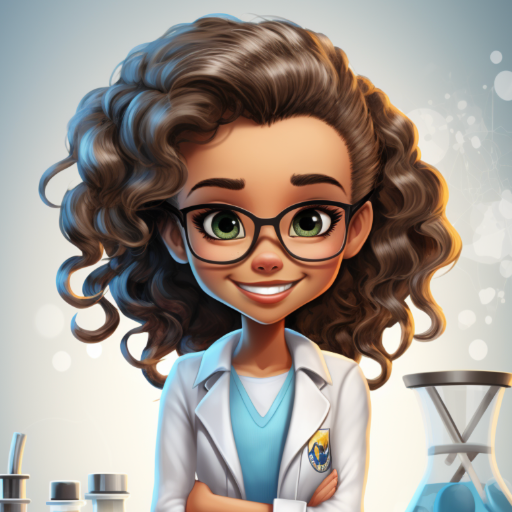chemistry-AI-Powered Chemistry Tutor
AI-driven insights for chemistry mastery
Basic mode
Organic mode
Analytical mode
Enter Questions below
Related Tools
Load More
Chemistry Chem
🔷#𝟏 𝐏𝐞𝐫𝐬𝐨𝐧𝐚𝐥𝐢𝐳𝐞𝐝 𝐂𝐡𝐞𝐦𝐢𝐬𝐭𝐫𝐲 𝐓𝐮𝐭𝐨𝐫🔷

Chemistry Tutor
Advanced & engaging chemistry tutor, tailored for students.

ChemistryGPT
Your go-to source for all things chemistry

Advanced Physical Chemistry Tutor
Tutor for graduate-level physical chemistry.

Quimica General
Quimica general de universidad, creador de problemas, responde respuestas y ayuda a estudiar y entender mejor los temas

Chemistry Lab Partner
Turbocharge your research and streamline your path to breakthrough findings. Leveraging the vast resources of PubChem, this GPT taps into a wealth of chemical data—from substances to proteins and patents—unleashing the full potential of your data for rich
20.0 / 5 (200 votes)
Introduction to Chemistry
Chemistry is a branch of science focused on the study of matter, its properties, how and why substances combine or separate to form other substances, and how substances interact with energy. This field is fundamental to understanding the world around us because it explains the composition, structure, and changes of matter. For example, chemistry helps us understand processes like why iron rusts, how food is metabolized in our bodies, and the principles behind cleaning agents removing stains. The design purpose of chemistry is to provide a comprehensive understanding of these phenomena through a combination of theoretical concepts, laboratory practices, and real-world applications.

Main Functions of Chemistry
Understanding Chemical Reactions
Example
The combustion of gasoline in an engine
Scenario
In a car engine, gasoline combusts with oxygen in a series of chemical reactions to produce energy, carbon dioxide, and water. Understanding these reactions helps engineers design more efficient engines and fuels.
Developing Pharmaceuticals
Example
Synthesis of aspirin
Scenario
Pharmaceutical chemists study chemical compounds to develop new medications. The synthesis of aspirin involves the reaction of salicylic acid with acetic anhydride, which chemists optimize for yield and purity to produce effective pain relief medications.
Environmental Monitoring
Example
Measuring air quality
Scenario
Analytical chemists use various techniques to monitor pollutants in the air, such as ozone or particulate matter. This information is crucial for environmental protection agencies to regulate emissions and protect public health.
Ideal Users of Chemistry Services
Students
High school and university students studying chemistry can benefit greatly from chemistry services. These students need to understand the fundamental principles and applications of chemistry to excel in their academic pursuits and future careers.
Researchers and Professionals
Individuals working in research and development, pharmaceuticals, environmental science, and related fields rely on a deep understanding of chemistry to innovate and solve complex problems. Chemistry services provide them with the necessary knowledge and tools to advance their work.

Steps to Use Chemistry
Visit aichatonline.org for a free trial without login, also no need for ChatGPT Plus.
This is the initial step to start using the Chemistry tool. It provides free access without requiring any login or subscription to premium services.
Explore different chemistry modes.
Select from Introductory Chemistry, Organic Chemistry, Analytical Chemistry, or Physical Chemistry based on your specific learning needs or project requirements.
Enter your questions or topics.
Input detailed queries or select topics to receive comprehensive explanations, tutorials, and guidance tailored to your level of understanding.
Utilize the interactive learning features.
Engage with interactive tutorials, practice problems, and Q&A sessions to deepen your understanding and retention of chemistry concepts.
Access additional resources and tools.
Use provided links to credible chemistry resources, download content for further study, and take advantage of the VIP community for continuous learning and support.
Try other advanced and practical GPTs
English Explainer
AI-Powered English Explanation and Breakdown

Miracle Sports Predictor (기적의 스포츠 승부 예측)
AI-Driven Sports Predictions at Your Fingertips.

Professore di Filosofia
Explore Philosophy's Depth with AI.

Dungeon Forge
AI-powered D&D content creation tool.

Practice English Conversation - (Voice)
AI-Powered English Conversation Practice

RedBub Product Assistant
AI-powered tool for Redbubble artists.

GPT Finder
Discover the perfect AI tool for any task

Next.js, Supabase, Shadcn, and Tailwind Developer
AI-powered web app development.
Deluge Expert
AI-powered guidance for Zoho Deluge coding

らくらく台本メーカー(スピリチュアル宇宙)
AI-Powered Spiritual Script Creation

Academic Enhancer
AI-powered academic writing enhancement

Email Enhancer
AI-powered email improvement tool.

- Exam Prep
- Concept Clarification
- Research Help
- Advanced Study
- Lab Skills
Chemistry Q&A
How can Chemistry help me understand chemical reactions?
Chemistry offers detailed explanations of reaction mechanisms, step-by-step breakdowns of processes, and interactive exercises to help you grasp the intricacies of chemical reactions.
What topics can Chemistry cover in organic chemistry?
Chemistry covers a wide range of organic chemistry topics including hydrocarbons, functional groups, synthesis strategies, and spectroscopy techniques, providing comprehensive knowledge and problem-solving skills.
Can Chemistry assist with laboratory techniques?
Yes, Chemistry provides guidance on various analytical methods such as chromatography, spectroscopy, and electrochemistry, helping you understand and apply these techniques in a lab setting.
What is the best way to use Chemistry for exam preparation?
Use Chemistry's interactive tutorials and Q&A sessions to review key concepts, practice problem-solving, and get detailed explanations for a solid understanding, ideal for exam preparation.
How does Chemistry support advanced studies in physical chemistry?
Chemistry offers in-depth tutorials on thermodynamics, kinetics, quantum chemistry, and statistical mechanics, helping you build a strong foundation for advanced study or research in physical chemistry.